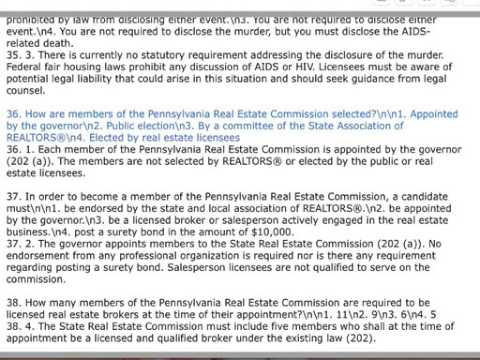
To become a licensed real estate agent in North Carolina, you first need to be licensed. You will need to complete pre-licensing education courses in real estate contracts, finance, and principles. You can take these classes online, which gives you more flexibility. It takes 75 hours to complete the classes.
You must have the following requirements to be a North Carolina real-estate agent
You must first become a licensed broker or salesperson to be a North Caroline realty agent. The pre-licensing class and the real estate licensing exam are required. After passing the exam, affiliate with a brokerage to activate and activate your license. The process usually takes around 10 days, but it can take up to thirty days.
North Carolina requires prospective real-estate agents to be at 18 years, either a U.S. citizen, or a qualified foreign alien under federal law. All prospective agents must pass the licensing exam and meet minimum qualifications.

Steps to licensing
In order to be licensed as a North Carolina real estate agent, you must complete a minimum of 75 hours of approved real estate education and pass a final exam proctored by the state's Real Estate Commission. After the course is completed, you must submit an application to this commission and pass a criminal background test.
You're likely to have some questions once you decide to make a career out of real estate. You can achieve success if the process isn’t as complicated as you think. Whether you're a recent high school graduate, a mid-30s career changer, or an older professional who wants to supplement their income during retirement, there are a variety of paths to take.
Prices
The cost of becoming a real estate agent in North Carolinia is $45.50 per year. You can pay the fee using VISA, MasterCard and Discover as well as American Express or Paypal. You must pay a continuing education fee in addition to your license fee. A $64 real estate exam is required in order to keep a license valid.
Before completing the real estate licensing exam, a person must take a pre-licensing course. The cost of prelicensing course fees will vary from one place to another. However, live classes in North Carolina typically cost between $150-300. It is a good idea to compare costs before you decide on a school. The school will typically provide all of the necessary study materials, but additional materials will be required.

Finding a real estate agent
It is likely that you have many questions regarding the process of getting into real estate. North Carolina law requires real estate agents in the state to be licensed. This requires some training as well as passing several exams. However, most agents pass the first time. This means you'll want to take the time to do your research.
Choosing a good agent is a vital step in the process of buying or selling a property. An agent who is knowledgeable and experienced can help you set your home apart from others and negotiate the most favorable deal. It's crucial to ensure that your home stands out from the rest, especially considering that North Carolina rents an average of $1,020 per monthly.
FAQ
How do I get rid termites & other pests from my home?
Your home will eventually be destroyed by termites or other pests. They can cause serious destruction to wooden structures like decks and furniture. You can prevent this by hiring a professional pest control company that will inspect your home on a regular basis.
What is a "reverse mortgage"?
Reverse mortgages allow you to borrow money without having to place any equity in your property. It allows you to borrow money from your home while still living in it. There are two types available: FHA (government-insured) and conventional. If you take out a conventional reverse mortgage, the principal amount borrowed must be repaid along with an origination cost. If you choose FHA insurance, the repayment is covered by the federal government.
What flood insurance do I need?
Flood Insurance covers flooding-related damages. Flood insurance protects your possessions and your mortgage payments. Learn more about flood insurance here.
Statistics
- It's possible to get approved for an FHA loan with a credit score as low as 580 and a down payment of 3.5% or a credit score as low as 500 and a 10% down payment.5 Specialty mortgage loans are loans that don't fit into the conventional or FHA loan categories. (investopedia.com)
- This seems to be a more popular trend as the U.S. Census Bureau reports the homeownership rate was around 65% last year. (fortunebuilders.com)
- 10 years ago, homeownership was nearly 70%. (fortunebuilders.com)
- Private mortgage insurance may be required for conventional loans when the borrower puts less than 20% down.4 FHA loans are mortgage loans issued by private lenders and backed by the federal government. (investopedia.com)
- This means that all of your housing-related expenses each month do not exceed 43% of your monthly income. (fortunebuilders.com)
External Links
How To
How to Manage a Rental Property
Although renting your home is a great way of making extra money, there are many things you should consider before you make a decision. We'll help you understand what to look for when renting out your home.
This is the place to start if you are thinking about renting out your home.
-
What should I consider first? You need to assess your finances before renting out your home. If you have outstanding debts like credit card bills or mortgage payment, you may find it difficult to pay someone else to stay in your home while that you're gone. It is also important to review your budget. If you don't have enough money for your monthly expenses (rental, utilities, and insurance), it may be worth looking into your options. You might find it not worth it.
-
How much will it cost to rent my house? There are many factors that go into the calculation of how much you can charge to let your home. These factors include your location, the size of your home, its condition, and the season. It's important to remember that prices vary depending on where you live, so don't expect to get the same rate everywhere. Rightmove shows that the median market price for renting one-bedroom flats in London is approximately PS1,400 per months. This means that your home would be worth around PS2,800 per annum if it was rented out completely. That's not bad, but if you only wanted to let part of your home, you could probably earn significantly less.
-
Is it worthwhile? Doing something new always comes with risks, but if it brings in extra income, why wouldn't you try it? Before you sign anything, though, make sure you understand exactly what you're getting yourself into. Renting your home won't just mean spending more time away from your family; you'll also need to keep up with maintenance costs, pay for repairs and keep the place clean. Make sure you've thought through these issues carefully before signing up!
-
What are the benefits? So now that you know how much it costs to rent out your home and you're confident that it's worth it, you'll need to think about the advantages. You have many options to rent your house: you can pay off debt, invest in vacations, save for rainy days, or simply relax from the hustle and bustle of your daily life. You will likely find it more enjoyable than working every day. And if you plan ahead, you could even turn to rent into a full-time job.
-
How do I find tenants Once you've decided that you want to rent out, you'll need to advertise your property properly. Make sure to list your property online via websites such as Rightmove. After potential tenants have contacted you, arrange an interview. This will help you evaluate their suitability as well as ensure that they are financially secure enough to live in your home.
-
How can I make sure that I'm protected? If you are worried about your home being empty, it is important to make sure you have adequate protection against fire, theft, and damage. You'll need to insure your home, which you can do either through your landlord or directly with an insurer. Your landlord may require that you add them to your additional insured. This will cover any damage to your home while you are not there. If your landlord is not registered with UK insurers, or you are living abroad, this policy doesn't apply. In such cases you will need a registration with an international insurance.
-
It's easy to feel that you don't have the time or money to look for tenants. This is especially true if you work from home. Your property should be advertised with professionalism. A professional-looking website is essential. You can also post ads online in local newspapers or magazines. Also, you will need to complete an application form and provide references. While some people prefer to handle everything themselves, others hire agents who can take care of most of the legwork. Interviews will require you to be prepared for any questions.
-
What happens once I find my tenant If you have a contract in place, you must inform your tenant of any changes. You may also negotiate terms such as length of stay and deposit. Keep in mind that you will still be responsible for paying utilities and other costs once your tenancy ends.
-
How do I collect my rent? You will need to verify that your tenant has actually paid the rent when it comes time to collect it. If your tenant has not paid, you will need to remind them. Before you send them a final invoice, you can deduct any outstanding rent payments. You can always call the police to help you locate your tenant if you have difficulty getting in touch with them. If there is a breach of contract they won't usually evict the tenant, but they can issue an arrest warrant.
-
What can I do to avoid problems? Renting out your house can make you a lot of money, but it's also important to stay safe. Consider installing security cameras and smoke alarms. It is important to check that your neighbors allow you leave your property unlocked at nights and that you have sufficient insurance. You should not allow strangers to enter your home, even if they claim they are moving in next door.